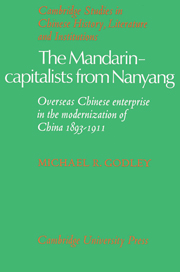 The Mandarin-Capitalists from Nanyang
The Mandarin-Capitalists from Nanyang Book contents
- Frontmatter
- Contents
- Dedicated to Marilyn, Heather and David
- Preface
- Note
- Map
- Introduction
- PART I THE RISE OF THE OVERSEAS CHINESE CAPITALIST
- 1 The foreign experience
- 2 Environment and Chinese values
- 3 China's discovery of the Nanyang Chinese
- 4 The recruitment of Chang Pi-shih
- PART II OVERSEAS CHINESE ENTERPRISE IN THE MODERNIZATION OF CHINA
- Epilogue: Old faces in a new government
- Notes
- Select Bibliography
- Glossary
- Index
2 - Environment and Chinese values
Published online by Cambridge University Press: 23 September 2009
- Frontmatter
- Contents
- Dedicated to Marilyn, Heather and David
- Preface
- Note
- Map
- Introduction
- PART I THE RISE OF THE OVERSEAS CHINESE CAPITALIST
- 1 The foreign experience
- 2 Environment and Chinese values
- 3 China's discovery of the Nanyang Chinese
- 4 The recruitment of Chang Pi-shih
- PART II OVERSEAS CHINESE ENTERPRISE IN THE MODERNIZATION OF CHINA
- Epilogue: Old faces in a new government
- Notes
- Select Bibliography
- Glossary
- Index
Summary
CONFLICT AND CONSENSUS
While it is true that the Anglicization process produced its zealots, including one Chinese British subject who circulated a petition in 1900 volunteering Straits Chinese service against the Boxer Uprising in China, the outstanding feature of the Singapore and Penang Chinese communities from about 1890 to 1900 was the cooperation that existed between the English-educated local-born and the more conservative China-born immigrants. By the turn of the century, there were over 160,000 Chinese in the city of Singapore alone and the growth of the population together with the political debate in China and the modernizing impulse within the Straits Chinese British Association made Singapore a complex sociological melting pot and enabled the Chinese community to select its leadership from an increasingly wider range of viewpoints. The factionalism of the Chinese Revolution and occasional violence reached Singapore after 1908 and caused considerable polarization in Chinatown, but as a general rule, the first decade of this century was characterized by a spirit of cooperation for the public good.
At the heart of the problem of selecting leaders from such a wide field were the old problems of status, education and material well-being. As the Lim–Song debate underscored, all sections of the Singapore Chinese body were acutely aware of the fact that their success abroad depended to a greater or lesser extent upon the degree to which they turned their backs on tradition.
- Type
- Chapter
- Information
- The Mandarin-Capitalists from NanyangOverseas Chinese Enterprise in the Modernisation of China 1893–1911, pp. 32 - 59Publisher: Cambridge University PressPrint publication year: 1981


